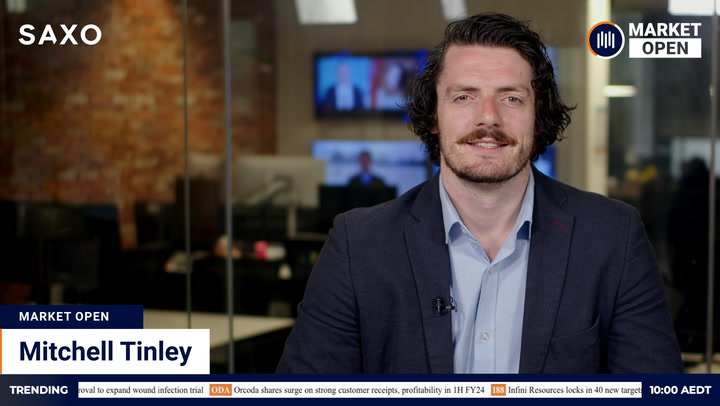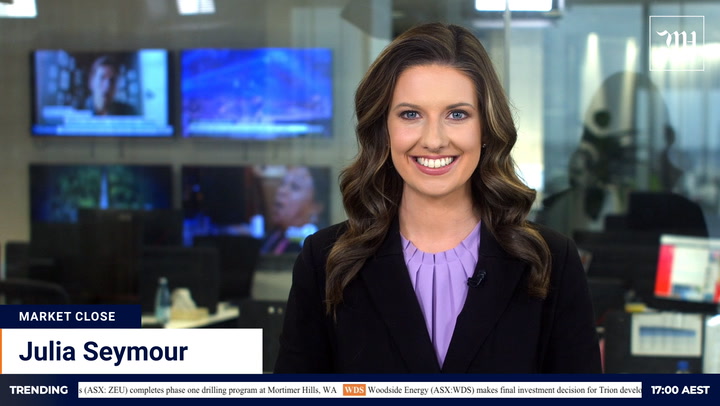The ASX was poised to open higher despite a mixed night on Wall Street as worries about a resurgence in Covid-19 cases weighed on commodity prices.
Australian equity futures rallied 25 points or 0.34 per cent, signalling another crack at record levels following a flat start to the week. The S&P/ASX 200 put on as much as 29 points in early action yesterday before closing unchanged as crude, gold and US futures declined.
Overnight, crude fell to a three-week low. Gold closed 2.1 per cent lower after briefly falling more than 5 per cent during yesterday’s Australian session. Iron ore finished steady.
Wall Street
Energy companies steered the Dow and S&P 500 lower as traders fretted about the demand implications of rising coronavirus cases in Asia and the US. Financial stocks rallied as bond yields continued to improve in the wake of Friday’s stronger-than-expected July jobs report.
The S&P 500 eased four points or 0.09 per cent. The Dow Jones Industrial Average shed 107 points or 0.3 per cent. The Nasdaq Composite reversed early losses to finish 24 points or 0.16 per cent ahead
The energy sector sagged 1.48 per cent as China ramped up efforts to contain the highly-contagious delta variant. Beijing cancelled major events scheduled later this month and has reimposed travel restrictions in parts of the country. Customs data showed Chinese crude imports remain weak by historic standards.
“Market participants are watching the rising coronavirus figures in Asia with considerable alarm, as this could prompt the Chinese government to take drastic measures in line with its strict zero covid strategy, despite numbers there still being at a low level,” Carsten Fritsch, commodity analyst at Commerzbank, wrote.
US infection rates also trended higher. The seven-day average of cases rose to 108,600 per day on Sunday, a rise of 36 per cent from the previous week, according to John Hopkins University. Hospitalisations were the highest in six months.
“Covid is weighing heavily on the financial markets,” Jim Paulsen, chief investment strategist at the Leuthold Group, said. “The surge in cases continues to pressure the cyclical parts of the stock market the most including cyclical sectors like energy and industrials and small cap stocks.”
Chevron fell 1.67 per cent, Exxon Mobil 1.14 per cent and Diamondback Energy 3.52 per cent. The Russell 2000 index of small caps declined 0.58 per cent. The industrial sector retreated 0.4 per cent. However, global bellwethers Caterpillar and Boeing resisted the downtrend, gaining 0.26 and 0.41 per cent, respectively.
Financial shares were buoyed by a rise in US treasury yields after a report on job openings reaffirmed the strength of the labour market. Job openings hit 10.1 million in June, well ahead of the 9.1 million anticipated by economists polled by Dow Jones.
The yield on ten-year US treasuries was last up more than two basis points at 1.323 per cent. Morgan Stanley predicted yields will continue to rise into year-end after bottoming at 1.125 per cent.
“Strong US data, back-to-school success, ‘advanced notice’ on Fed tapering, and progress on infrastructure make the US stand out,” the company said.
Australian outlook
The market looks primed for further gains with the big banks to lead the way, as they have for the last week. US financials outperformed overnight as rates continued to rebound. While the outlook here is muddied by lockdowns and a “zero Covid” policy, Australian rates have also shown signs of improvement. The yield on ten-year Australian government bonds was last up two basis points to its highest in a week.
Energy stocks, miners and some traditional bond proxies weighed in the US overnight. The energy sector fell 1.48 per cent, real estate 0.4 per cent, materials 0.12 per cent and utilities 0.12 per cent.
The S&P/ASX 200 finished flat yesterday amid severe ructions on commodity markets. Precious metals suffered what some commentators were calling a “flash crash”.
Gold dived more than 5 per cent before mounting a partial recovery. Market analysts attributed the collapse to light volumes in Asia due to public holidays in Japan and Singapore. Nonetheless, such events undermine confidence in markets and could be a harbinger of further dislocations as financial instruments adjust to the outlook for US rates.
The US dollar has firmed significantly over the last two sessions as Friday’s jobs data prompts forex traders to adjust expectations for the timeline for the Federal Reserve reducing support for the economy. A rising dollar makes commodities more expensive for holders of other currencies.
Back home, reporting season continues today with earnings from Challenger, Megaport, Computershare, James Hardie and Coronado.
Today’s economic menu includes weekly consumer sentiment figures and monthly reports on business sentiment and building approvals.
Strength in the greenback pushed the dollar back towards 73 US cents. The Aussie was last down 0.04 per cent at 73.32 US cents.
Commodities
Gold finished a wild session at its weakest since March. Gold for December delivery plunged as low as US$1,672.80 before settling US$36.60 or 2.1 per cent lower at US$1,726.50 an ounce. The NYSE Arca Gold Bugs Index dropped 2.57 per cent.
“Gold’s overnight flash crash was a perfect mix of Asia playing catch-up with their Fed taper bets, plunging commodities as slowdown concerns grow across Asia, and some thin conditions given the holidays in Japan and Singapore,” Edward Moya, senior market analyst at Oanda, wrote.
Oil settled at a three-week low, extending last week’s losses following a Chinese crackdown to contain Covid. Brent crude fell US$1.66 or 2.4 per cent to US$69.04 a barrel. The US benchmark declined 2.6 per cent.
Iron ore finished flat at US$171.20 a tonne on the Tianjin spot market. A report showed Chinese imports declined 1 per cent in July, falling for a fourth straight month. July imports of 88.5 million tonnes were the lowest since May 2020, according to Mysteel Global.
BHP‘s US-listed stock dipped 0.23 per cent after its UK-listed stock put on 0.39 per cent. Rio Tinto rallied 0.71 per cent in the US and 0.94 per cent in the UK.
Copper fell to a two-week low as industrial metals succumbed to a firming greenback. Benchmark copper on the London Metal Exchange declined 1.1 per cent to US$9,342.75 a tonne. Aluminium lost 1.2 per cent, nickel 3.1 per cent, lead 1.2 per cent, zinc 1.1 per cent and tin 0.2 per cent.







